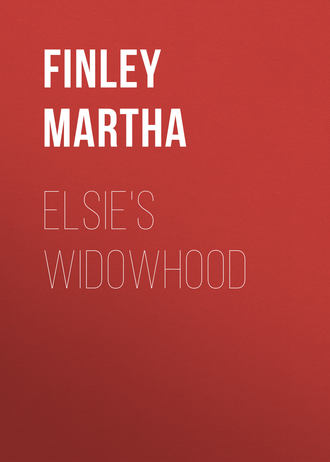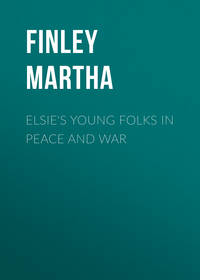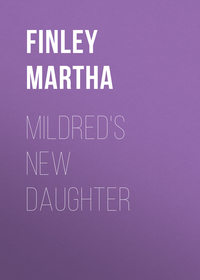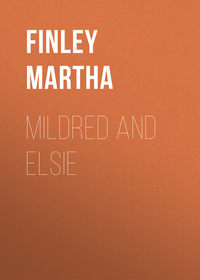 полная версия
полная версияElsie's Widowhood
Mr. Dinsmore's countenance expressed extreme satisfaction. "I am glad of it," he said; "they seem made for each other."
"But Aunt Louise, papa?"
"Will not fancy a poor clergyman for a son-in-law, yet will consider even that better than not seeing her daughter married at all. And if the two most intimately concerned are happy and content, what matter for the rest?"
"Oh papa!" Elsie returned with a smile that had something of old-time archness in it, "have not your opinions in regard to the rights of parents and the duties of children changed somewhat since my early girlhood?"
"Circumstances alter cases," he answered with a playful caress. "I should never have objected to so wise a choice as Isa's – always supposing that she has made the one we are talking of."
"And you will not mind if Aunt Louise blames you? or me?"
"I shall take all the blame and not mind it in the least."
Yes, Cyril Keith and Isadore Conly were made for each other, and had become conscious of the fact, though no word of love had yet been spoken.
To him she was the sweetest and loveliest of her sex, in whom he found a stronger union of beauty, grace, accomplishments, sound sense and earnest piety than in any other young lady of his acquaintance; while to her he was the impersonation of all that was truly noble, manly and Christian.
They were dreaming love's young dream, and found intense enjoyment each in the other's society, especially amid all the loveliness of nature that surrounded them.
Cyril's was a whole-hearted consecration to his divine Master and that loved Master's work, but this human love interfered not in any way with that, for it is of God's appointment.
"'And the Lord God said, It is not good that the man should be alone; I will make him an help meet for him.' 'Whoso findeth a wife findeth a good thing, and obtaineth favour of the Lord.'"
"How like you that is, papa dear," Elsie said; "but it would be easier to me to bear blame myself than to have it heaped upon you. I suppose, though, that it would be useless to attempt any interference with the course of true love?"
"Yes; we will simply let them alone."
Mr. Dinsmore rode over to Magnolia Hall that afternoon to seek an interview with its owner; but learned that he was not at home, and might not be for a day or two. No one knew just when he would return. So the only course now left seemed to be to wait till he should call again at Viamede.
He had been an almost daily visitor of late, and often sent some token of remembrance by a servant – fruit, flowers, game or fish, or it might be a book from his library which was not found in theirs.
But now one, two, three days passed and nothing was seen or heard of him.
Sad, wearisome days they were to Molly: mental labor was next to impossible; she could not even read with any enjoyment; her heart was heavy with grief and unsatisfied longing, intensified by her mother's constant reiteration, "You've offended him, and he'll never come again; you've thrown away the best chance a girl ever had; and you'll never see another like it."
Then it was unusually long since she had heard from Dick; and she had waited for news from a manuscript which had cost her months of hard work, and on which great expectations were based, till her heart was sick with hope deferred.
It was on the morning of the fourth day that Molly, having persuaded her mother to go for a walk with her grandfather and Mrs. Carrington, summoned a servant and desired to be taken out into the grounds.
She sat motionless in her chair gazing in mournful silence on all the luxuriant beauty that surrounded her, while the man wheeled her up one walk and down another.
At length, "That will do, Joe," she said; "you may stop the chair under that magnolia yonder, and leave me there for an hour."
"I'se 'fraid you git tired, Miss Molly, and nobody roun' for to wait on you," he remarked when he had placed her in the desired spot.
"No; I have the bell here, and it can be heard at the house. I have a book, too, to amuse myself with: and the gardener yonder is within sight. You need not fear to leave me."
He walked away and she opened her book. But she scarcely looked at it. Her thoughts were busying themselves with something else, and her eyes were full of tears.
A quick, manly step on the gravel walk behind her startled her and sent a vivid color over face and neck.
"Good morning, Miss Percival; I am fortunate indeed in finding you here alone," a voice said, close at her side.
"Good morning, Mr. Embury," she returned, with a vain effort to steady her tones, and without looking up.
He took possession of a rustic seat close to which her chair was standing. "Molly, my dear Miss Molly," he said, in some agitation, "I fear I have unwittingly offended."
"No, no, no!" she answered, bursting into tears in spite of herself. "There, what a baby I am!" dashing them angrily away. "I wish you wouldn't come here and set me to crying."
"Let me tell you something, let me ask you one question; and then if you bid me, I will go away and never come near you again," he said, taking her hand and holding it fast. "Molly, I love you. I want you to be my wife. Will you?"
"Oh you don't mean it! you can't mean it! no man in his senses would want to marry me – a poor helpless cripple!" she cried, trying to pull the hand away, "and it's a cruel, cruel jest! Oh how can you!" and covering her face with the free hand, she sobbed as if her heart would break.
"Don't, don't, dear Molly," he entreated. "I am not jesting, nor am I rushing into this thing hastily or thoughtlessly. Your very helplessness draws me to you and makes you doubly dear. I want to take care of you, my poor child. I want to make up your loss to you as far as my love and sympathy can; to make your life bright and happy in spite of your terrible trial."
"You are the noblest, most unselfish man I ever heard of," she said, wiping away her tears to give him a look of amazement and admiration; "but I cannot be so selfish as to take all when I can give nothing in return."
"Do you call yourself – with your sweet face, cheery disposition, brilliant talents, and conversational powers that render you the most entertaining and charming of companions – nothing? I think you a greater prize than half the women who have the free use of all their limbs."
"You are very kind to say it."
"No, I am not, for it is the simple, unvarnished truth. Molly, if you can love me, I should rather have you than any other woman on earth. How your presence would brighten my home! I give all indeed! you will be worth more to me than all I have to give in return. O Molly, have you no love to bestow upon poor me?"
She had ceased the struggle to free her hand from the strong yet tender clasp in which it was held, but her face was averted and tears were falling fast. His words had sent a thrill of exquisite joy to her heart, but instantly it changed to bitter sorrow.
"You cannot have counted the cost," she said. "I am poor; I have nothing at all but the pittance I earn by my pen. And think: I can never walk by your side: I cannot go about your house and see that your comfort is not neglected, or your substance wasted. I cannot nurse you in sickness or wait upon you in health as another woman might. Oh cannot you see that I have nothing to give you in return for all you – in your wonderful generosity – are offering to me?"
"Your love, dear girl, and the blessed privilege of taking care of you, are all I ask, all I want – can you not give me these?"
"Oh, why do you tempt me so?" she cried.
"Tempt you? would it be a sin to love me? to give yourself to me when I want you so much, so very much?"
"It seems to me it would be taking advantage of the most unheard-of generosity. What woman's heart could stand out against it?"
"Ah, then you do love me!" he exclaimed, in accents of joy, and lifting her hand to his lips. "You will be mine? my own dear wife? a sweet mother to my darlings. I have brought them with me, that their beauty and sweetness, their pretty innocent ways, may plead my cause with you, for I know that you love little children." He was gone before she could reply, and the next moment was at her side again, bearing in his arms two lovely little creatures of three and five.
"These are my babies," he said, sitting down with one upon each knee. "Corinna," to the eldest, "don't you want this sweet lady to come and live with us and be your dear mamma?"
The child took a long, searching look into Molly's face before she answered; then, with a bright, glad smile breaking like sunlight over her own, "Yes, papa, I do!" she said, emphatically. "Won't you come, pretty lady? Madie and I will be good children, and love you ever so much." And she held up her rosebud mouth for a kiss.
Molly gave it very heartily.
"Me, too – you mustn't fordet to tiss Madie," the little one said.
Molly motioned the father to set the child in her lap, and, putting an arm about Corinna, petted and fondled them both for a little, the mother instinct stirring strongly within her the while.
"There, that will do, my pets; we must not tire the dear lady," Mr. Embury said presently, lifting his youngest and setting her on her feet beside her sister. "Go back now to your mammy. See, yonder she is, waiting for you."
"What darlings they are," Molly said, following them with wistful, longing eyes.
"Yes. Ah, can your heart resist their appeal?"
"How could I, chained to my chair, do a mother's part by them?" she asked mournfully, and with a heavy sigh.
"Their physical needs are well attended to," he said, again taking her hand, while his eyes sought hers with wistful, pleading tenderness; "it is motherly counsels, sympathy, love they want. Is it not in your power to give them all these? I would throw no burdens on you, love; I only aim to show you that the giving need not necessarily be all on my side, the receiving all on yours."
"How kind, how noble you are," she said, in moved tones. "But your relatives? your other children? how would they feel to see you joined for life to a – "
"Don't say it," he interrupted, in tones of tenderest compassion. "My boys will be drawn to you by your helplessness, while they will be very proud of your talents and your sweetness. I have no other near relatives but two brothers, who have no right to concern themselves in the matter, nor will be likely to care to do so. But, O, dearest girl, what shall I, what can I say to convince you that you are my heart's desire? that I want you, your love, your dear companionship, more than tongue can tell? Will you refuse them to me?"
She answered only with a look, but it said all he wished.
"Bless you, darling!" he whispered, putting his arm about her, while her head dropped upon his shoulder, "you have made me very happy."
Molly was silent, was weeping, but for very gladness; her heart sang for joy; not that a beautiful home, wealth, and all the luxury and ease it could purchase, would now be hers, but that she was loved by one so noble and generous, so altogether worthy of her highest respect, her warmest affection, the devotion of her whole life, which she inwardly vowed should be his. She would strive to be to him such a wife as Elsie had been to her husband, such a mother to his children as her sweet cousin was to hers.
CHAPTER XVI
"I saw her, and I loved her —I sought her, and I won.""Across the threshold led,And every tear kiss'd off as soon as shed,His house she enters, there to be a lightShining within, when all without is night;A guardian angel, o'er his life presiding,Doubling his pleasure, and his cares dividing."– Roger."You declined a drive with me the last time I asked you," Mr. Embury remarked, breaking a momentary silence that had fallen between them, "but will you not be more gracious to-day? My carriage is near at hand, and I have a great desire to take you for an airing – you and the babies."
Blushing deeply, Molly said, "Yes, if you wish it, and will bring me back before I am missed."
"I shall take good care of you, as who would not of his own?" he said, bending down to look into her face with a proud, fond smile; "yes, you are mine now, dearest, and I shall never resign my claim. Ah," as he lifted his head again, "here comes your uncle, and I fancy he eyes me with distrust. Mr. Dinsmore," and he stepped forward with outstretched hand, "how do you do, sir? What do you say to receiving me into the family? I trust you will not object, for this dear girl intends to give me the right to call you uncle."
Mr. Dinsmore grasped the hand, looking in silent astonishment from one to the other. He read the story of their love in both faces – Molly's downcast and blushing, yet happy; Mr. Embury's overflowing with unfeigned delight.
"I assure you, sir," he went on, "I am fully aware that she is a prize any man might be proud to win. Your niece is no ordinary woman: her gifts and graces are many and great."
"She is all that you have said, and even more," her uncle returned, finding his voice. "And yet – you are quite sure that this is not a sudden impulse for which you may some day be sorry?"
He had stepped to Molly's other side and taken her hand in his, in a protecting, fatherly way. "It would wreck her happiness," he added, in moved tones, "and that is very dear to me."
"It cannot be dearer to you, sir, than it is to me," the lover answered; "and rest assured your fears are groundless. It is no sudden impulse on my part, but deliberate action taken after weeks of careful and prayerful consideration. You seem to stand in the place of a father to her; will you give her to me?"
"Mr. Embury, you are the noblest of men, and must forgive me that I had some suspicion that you were thoughtlessly trifling with the child's affections. I see you have won her heart, and may you be very happy together."
Mr. Dinsmore was turning away, but Mr. Embury stopped him.
"Let me thank you, sir," he said, again holding out his hand. "We are going for a little drive," he added, "and please let no one be anxious about Miss Percival. I am responsible for her safe return."
Molly's chair rolled on with rapid, steady movement to the entrance to the grounds, where Mr. Embury's carriage stood; then she felt herself carefully, tenderly lifted from one to the other and comfortably established on a softly cushioned seat.
How like a delightful dream it all seemed – the swift, pleasant motion through the pure, sweet, fragrant air; beautiful scenery on every hand; the prattle of infant voices and the whispers of love in her ear. Should she not awake presently to its unreality? awake to find herself still the lonely, unloved woman she was in her own esteem but an hour ago, and who by reason of her sad infirmity could look forward to nothing else through life?
They turned in at an open gateway, and Molly, suddenly rousing herself, said, in surprise, "We are entering some one's private grounds, are we not?"
"Yes," was the quiet reply, "but there is no objection. The owner and I are on the most intimate terms. I admire the place very much, and want you to see it, so we will drive all around the grounds." And he gave the order to the coachman.
Molly looked and admired. "Charming! almost if not quite equal to Viamede."
His eyes shone. "Your taste agrees with mine," he said. "Look this way. We have a good view of the house from here. What do you think of it?"
"That it is just suited to its surroundings, and must be a delightful residence."
"So it is; and I want to show you the inside too. There's no objection," as he read hesitation and disapproval in her face; "the master and mistress are not there, and – in fact I have charge of the place just now, and am quite at liberty to show it to strangers."
The next moment they drew up before the front entrance. Mr. Embury hastily alighted and lifted out the little ones, saying in a low tone something which Molly did not hear as he set them down.
They ran in at the open door, and turning to her again he took her in his strong arms and bore her into a lordly entrance hall; then on through, one spacious, elegantly furnished room after another – parlors, library, dining and drawing-rooms – moving slowly that she might have time so gaze and admire, and now and then setting her down for a few moments in an easy chair or on a luxurious sofa, usually before a rare painting or some other beautiful work of art which he thought she would particularly enjoy.
The children had disappeared, and they were quite alone.
He had reserved a charming boudoir for the last. Open doors gave tempting glimpses of dressing and bedrooms beyond.
"These," he said, placing her in a delightfully easy, velvet cushioned chair, and standing by her side, "are the apartments of the mistress of the mansion, as you have doubtless already conjectured. What do you think of them?"
"That they are very beautiful, very luxurious. And oh what a lovely view from yonder window!"
"And from this, is it not?" he said, stepping aside and turning her chair a little that she might see, through a vista of grand old trees, the lagoon beyond sparkling in the sunlight.
"Oh that is finer still!" she cried. "I should think one might almost be content to live a close prisoner here."
"Then I may hope my dear wife will not be unhappy here? will not regret leaving the beauties of Viamede and the charming society there for this place and the companionship of its owner? Molly, dearest, this is Magnolia Hall; you are its mistress, and these are your own rooms," he said, kneeling by her side to fold her to his heart with tenderest caresses.
"It is too much, oh you are too good to me!" she sobbed, as her head dropped upon his shoulder.
On leaving Mr. Embury and Molly, Mr. Dinsmore hastened to join his wife and daughter, who were sitting together on the lawn. The interview between the lovers having taken place in a part of the grounds not visible from where they sat, they had seen nothing of it.
"You look like the bearer of glad tidings, my dear," Rose remarked, glancing inquiringly at her husband as he seated himself at her side.
"And so I am, wife," he answered joyously. "Elsie, you may spare yourself any further regrets because of your kindness to Mr. Embury. He is a noble, generous-hearted fellow, and very much in love with our poor, dear Molly. They are engaged."
"Engaged?" echoed both ladies simultaneously, as much surprised and pleased as he had hoped to see them.
"Yes," he said, and went on to repeat what had passed between himself and the newly-affianced pair.
"Dear Molly," Elsie said with tears trembling in her eyes, "I trust there are many very happy days in store for her. And how pleased Aunt Enna will be, she was so desirous to bring about the match."
"Molly herself should have the pleasure of telling her."
"Yes, indeed, papa."
"There is something else," Mr. Dinsmore said. "At Mr. Embury's suggestion I wrote to Dick two or three weeks ago, telling him that there was a good opening for a physician here, and asking if he would not like to come and settle if pleased with the country. His answer came this morning, and he will be with us in a few days."
"How glad I am!" was Elsie's exclamation. "Molly's cup of happiness will be full to overflowing."
Rose, too, was rejoiced; but she had heard before of the invitation to Dick, and was less surprised at this news than Elsie was.
The ladies had their work, Mr. Dinsmore the morning paper, and the three were still sitting there when Mr. Embury's carriage returned.
Molly's face was radiant with happiness; Mr. Embury's also; and the faces of the friends who gathered about them in the library, whither he carried her, seemed to reflect the glad light in theirs.
Everybody was rejoiced at Molly's good fortune, and pleased to receive Mr. Embury into the family, for they all respected and liked him.
Enna's delight on hearing the news was unbounded; she half smothered her daughter with kisses, and exclaimed over and over again, "I knew he wanted you! And didn't I tell you there'd be somebody better worth having than Elsie's lover coming after you some day? And I'm as glad as can be that my girl's going to be married the first of all – before Louise's girls, or Elsie's either!"
"I can't see that that makes the least difference, mother," Molly said, laughing for very gladness. "But oh what a good and kind man he is! and what a lovely home we are to have! for, mother, he says you are to live with us always if you like."
"Now that is nice!" Enna said, much gratified. "And is it as pretty as Viamede?"
"It is almost if not quite as beautiful as Viamede, though not quite so large; both house and grounds are, I believe, a little smaller."
"How soon are you going to be married?"
"I don't know just when, mother; the day has not been set."
"I hope it will be soon, just as soon as we can get you ready."
This was a little private chat in Molly's room after Mr. Embury had gone away. She had asked to have her chair wheeled in there, and to be left alone with her mother while she told her the news of her engagement.
"I must consult with uncle and aunt and Cousin Elsie about that," she said in answer to her mother's last remark. "Will you please open the door now and ask them to come in? I don't care if the rest come too."
"Well, Molly, when, where, and by whom is the knot to be tied?" asked Mr. Dinsmore playfully, as he stood by her side looking down with a kindly smile at her blushing, happy face.
"O uncle, so many questions at once!"
"Well, one at a time then: When?"
"That foolishly impatient man wanted me to say to-night," she answered, laughing, "and when I told him how absurd an idea that was, he insisted that a week was quite long enough for him to go on living alone."
"A week!" exclaimed her aunt. "You surely did not consent to that?"
"No," Aunt Rose, "but I believe I half consented to try to make my preparations in two weeks. I doubt if we can quite settle that question now."
"There must be time allowed for furnishing you with a handsome trousseau, my dear child," Elsie said, "but possibly it can be accomplished in a fortnight. As to the next question – where? – you surely will let it be here, in my house?"
"Gladly, cousin, if pleasing to you," Molly answered with a grateful, loving look. "And Mr. Keith shall officiate, if he will. Of course it must be a very quiet affair; I should prefer that under any circumstances."
"You will invite Dick, will you not?" her uncle asked with a twinkle in his eye.
"Dick! oh the dear fellow! I ought to have him. I wonder if I could persuade him to leave his practice long enough to come. Two weeks would give him time to get here if I write at once."
"No need," her uncle replied. "Providence permitting, he will be here in less than half that time."
Then the whole story came out in answer to Molly's look of astonished inquiry, and her cup of happiness was indeed full to overflowing.
"Where did you drive, Molly?" asked Isa. "But I suppose you hardly know; you could see nothing but – your companion?"
"Ah, Isa, do you judge of me by yourself?" queried Molly gleefully. "By the way, though, I had three companions. But don't I know where I went?"
Then smiling, laughing, blushing, rosy and happy as they had never seen her before, she described the darling baby girls and the beautiful home.
But the sweet words of love that had been as music to her ear were too sacred for any other.
She had quite a large and certainly very attentive and interested audience, the whole family having gathered in the room. Enna and the young girls were especially delighted with the tale she had to tell.
"It's just like a story – the very nicest kind of a story!" cried Vi, clapping her hands in an ecstasy of delight when Molly came to that part of her narrative where she learned that she herself was to be the mistress of the lordly mansion she had entered as a stranger visitor, with all its wealth of luxury and beauty.
The next two or three weeks were full of pleasant bustle and excitement, preparations for the wedding being pushed forward with all possible dispatch, Mr. Embury pleading his loneliness and that he wanted Molly's relatives and friends to see her fairly settled in her new home before they left Viamede for the North.









